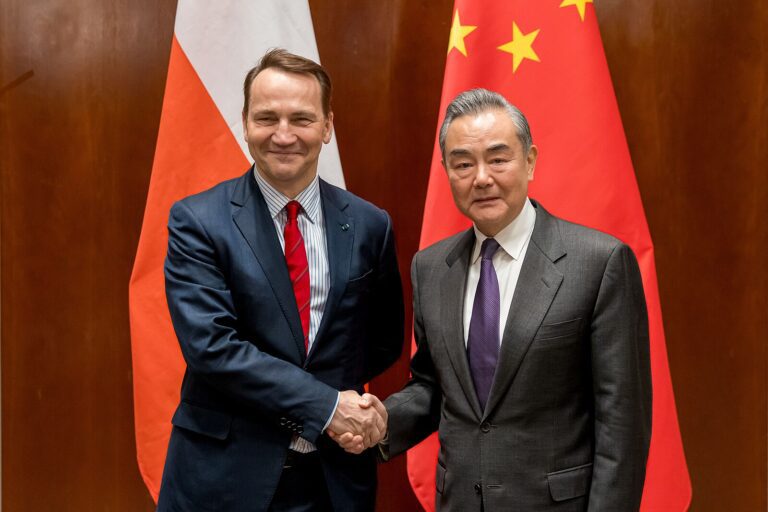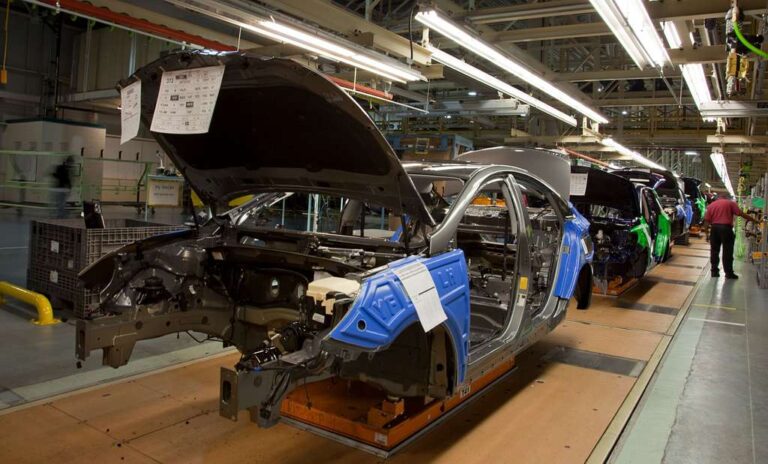
Five months into the term of Poland’s new government, Foreign Affairs Minister Radosław Sikorski delivered a foreign policy exposé, delineating Warsaw’s aims for the upcoming year. Sikorski reaffirmed Poland’s pragmatic stance towards China, balancing economic interests with concerns over ideological disparities and Beijing’s political tactics, while also avoiding any definitive decision to disengage.
Last week, in a special session of the parliament, Foreign Affairs Minister Radosław Sikorski delivered an hour-and-a-half-long speech outlining directions for Polish foreign policy. His address was attended by i.a. government members of the “15th October coalition” – a mix of liberal, centrist, and leftist parties – President Andrzej Duda, and ambassadors from various countries, including Sun Linjiang, the Chinese ambassador to Poland.
The speech affirmed Warsaw’s commitment to the cooperation within the EU and the partnership with the US, stressing the importance of maintaining strong ties with both. Sikorski emphasized that these relationships are complimenting pillars of Polish growth and strategy, and will remain a priority for Warsaw.
Regarding China, the most notable aspect was Poland’s supposed declaration of neutrality in the global rivalry between Washington and Beijing, with Sikorski openly stating that Warsaw does not want to “pick sides”. However, despite this somewhat surprising announcement, it appears that Poland will continue its current approach to Zhongnanhai, aligning with the strategy of the previous government and marking one of the very few common points between them.
The Pragmatists
Authors of the recent CHOICE study identified three approaches towards China in Central and Eastern Europe: countries not seeking cooperation with it (Czechia, Lithuania), “China loyalists” (Serbia, Hungary), and nations aware of the risks but still pursuing business ties with Beijing. Warsaw falls into the third group, standing just in the middle of this spectrum. Polish pragmatic stance can be concluded by the EPP’s motto, also coined by Sikorski, of “cooperating where possible, competing when necessary, and confronting when needed.”
Trying to find areas for cooperation, Sikorski declared Beijing an important economic partner for Poland. Since the beginning of the new era of Sino-Polish ties in 2008, Warsaw’s politicians have been dreaming about business with China boosting the domestic economy and positioning their country as a “gateway to Europe” as part of the BRI. There has been little change in the image of, in the words of Poland’s former agriculture minister, the “mythical China that everyone is so hopeful about.”
Warsaw’s pragmatic stance comes not only from potential economic benefits but also from the existing dependence on China. Lithuania’s case showed that Zhongnanhai can and will use economic dependence as a political tool; similar actions would most certainly hurt Poland. In 2022, China’s exports to the country were more than 13 times larger than Poland’s exports to China. Additionally, Poland relies heavily on Chinese goods, such as pharmaceuticals, which became evident during disruptions in the supply chain caused by COVID-19.
Between the Lines
However, Poland can hardly be seen as a stalwart supporter of Beijing. Significant differences are dividing these countries, and in the past Sikorski listed some of the problematic issues related to China: intellectual property theft, state-sponsored acquisitions of European companies, disinformation, and human rights violations.
Despite that, all hits on Zhongnanhai were made only between the lines. In Sikorski’s speech, Russia takes most of the blame – it is guilty of trying to disrupt the post-1989 international order or spreading propaganda of the Global North oppressing the Global South with its “allies”. He also called for combatting “autocracy” by monitoring foreign investments and the flow of sensitive technologies, securing critical raw material supplies, and reducing risks associated with “Asian supply chains.”
Polish public remarks regarding China in the past have been most assertive, but not very obtrusive, on Beijing’s quiet support for the Russian invasion of Ukraine. The Ukrainian war awoke Polish politicians to view Zhongnanhai as a rising security threat, standing on the opposing side of what they perceive as a battle not only between democracy and autocracy but also between good and evil.
Sikorski used his address to again try to convince Beijing to oppose “modern colonialism by Vladimir Putin,” using both Polish and Chinese historical experience, framing them as the “victims of colonialism and imposed treaties.” Interestingly enough, he also used the instance of Beijing’s positive influence during “Polish October” in 1956, the political shift towards more independence from the USSR. Amid the danger of Soviet military intervention like in “Hungarian October” in 1956, Mao strongly opposed the potential Soviet aggression.
Not Quite There Yet
Despite President Andrzej Duda’s upcoming visit to China, it is unlikely that Warsaw’s China policy will become significantly friendlier towards Beijing. The current ideological divide outweighs any shared interests, especially amid the ongoing Ukrainian conflict and China’s ambiguous stance towards it.
For now, Warsaw will tiptoe around China, prioritizing potential cooperation while avoiding unnecessary tensions. Also included in Sikorski’s expose was a hint of hope regarding Chinese support to get Poland into the G20 as a possible example of this partnership. This approach will most likely involve further postponing any controversial political decisions such as excluding Chinese tech companies from 5G network construction. Despite past actions like the arrest of a Huawei employee on espionage charges in 2019, the issue of introducing changes to the cybersecurity law has been swept under the rug.
At the same time, Poland will aim to reduce the existing trade deficit and increase its autonomy in decision-making without fear of economic repercussions. However, as Warsaw still sees itself as a smaller political player, any changes to a more assertive strategy will likely be implemented within the framework of the EU. This could be one of the goals of the Polish 2025 presidency of the Council of the EU.
Lastly, it is worth remembering that Poland’s reliance on the US for security may increase the pressure to choose sides more quickly than Warsaw thinks. In the event of a potential victory for Donald Trump in the November elections and the implementation of his policies favoring Putin or even an American withdrawal from NATO, Poland may be compelled to make significant overtures to Washington. Nonetheless, for the time being, Sikorski bought his country some time.
Written by
Joanna Nawrotkiewicz
nawrotkiewiczjJoanna Nawrotkiewicz is a Research Fellow at the Centre for Asian Affairs, Łódz University, Researcher at the Jagiellonian University, and an Expert for the CEE Digital Democracy Watch. She graduated from sinology and law at the MISH College of the University of Warsaw.

